Are you navigating the complexities of litigation costs and seeking clarity in your financial planning? Understanding the various expenses associated with legal proceedings can be overwhelming, but it doesn't have to be. This article will guide you through a structured proposal template designed specifically for litigation cost assessment, ensuring you have a clear roadmap for your budgeting process. Stick around to discover how you can streamline your approach and make informed decisions!
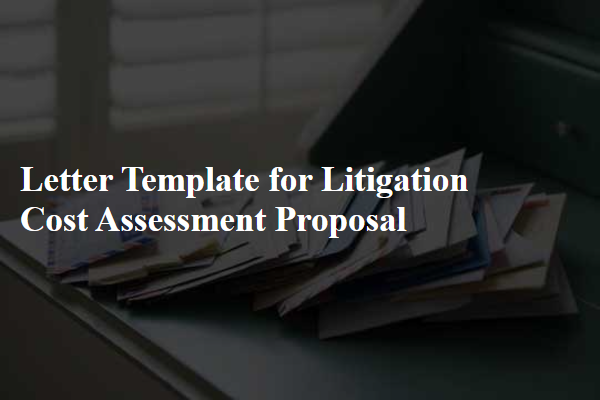
Clearly defined objectives and scope
A litigation cost assessment proposal should articulate objectives and scope to ensure clarity and precision. Key objectives involve evaluating legal expenses incurred during litigation processes, such as attorney fees, filing fees, expert witness costs, and court costs. The scope includes identifying cost drivers, analyzing billing statements, and determining whether the expenditures align with industry standards and relevant legal frameworks. This assessment may also encompass projecting potential future costs based on similar cases in jurisdictions such as California or New York, including a review of applicable statutes like the California Civil Code Section 1033.5. Additionally, the proposal will establish a timeline for completion and a breakdown of deliverables, ensuring stakeholders understand expectations for a comprehensive analysis and report.
Detailed cost breakdown and itemization
Litigation cost assessment is crucial for understanding the financial implications of legal proceedings. The proposal includes a detailed cost breakdown and itemization of expected expenses during the litigation process, such as attorney fees, which can range from $200 to $1,000 per hour depending on the firm's reputation and expertise. Court filing fees vary by jurisdiction, typically between $200 and $500, while deposition costs can accumulate to several thousand dollars, based on the number of witnesses and duration. Additional expenses include expert witness fees, which may reach $500 to $2,500 per hour, depending on their field and experience. Document preparation costs, including copying and scanning, may add another $300 to $1,000 to the total. Travel expenses related to court appearances should also be considered, including airfare, lodging, and transportation, varying significantly based on distance and duration. Finally, administrative costs, often around 10% of overall expenses, support the litigation process, ensuring all documents and communications are managed effectively. This comprehensive assessment will allow clients to anticipate potential costs, facilitating informed decision-making throughout the legal journey.
Timeline and schedule for delivery
A comprehensive litigation cost assessment proposal highlights the essential timeline and schedule for delivering cost analysis related to ongoing legal proceedings. The initial assessment phase spans approximately three weeks, involving the collection of relevant documentation, such as invoices and billing records from law firms, as well as interviews with stakeholders. During the second phase, projected costs and potential contingencies are meticulously calculated, estimated to take an additional two weeks. Following this, a detailed report outlining the assessment findings is planned for delivery within one week, allowing for any necessary revisions based on client feedback. Final approval of the report should occur no later than six weeks after the commencement of the project, ensuring all parties are aligned before proceedings advance.
Qualifications and expertise of legal team
The legal team's qualifications encompass extensive experience in litigation cost assessment, demonstrated through successful management of high-profile cases across various jurisdictions, including New York and California. Team members possess advanced degrees in law from prestigious institutions, such as Harvard Law School and Stanford University, further enhancing their analytical capabilities. The team includes certified legal cost auditors with over ten years of experience specializing in cost recovery and efficiency analysis, contributing to a deeper understanding of legal billing practices. Additionally, expertise includes familiarity with relevant statutes and regulations, such as the Uniform Commercial Code (UCC) and the American Bar Association guidelines, ensuring compliance and strategic positioning in assessments. Proven track record includes recovering millions in costs for clients in complex cases, reflecting the team's commitment to delivering effective and insightful litigation support.
Terms and conditions, including payment structure
A litigation cost assessment proposal outlines the terms and conditions related to the evaluation of legal expenses pertaining to a specific case. This involves a detailed analysis of billable hours, attorney fees (often exceeding $300 per hour for experienced lawyers), and additional costs such as court filing fees (which can range from $200 to $500) and expert witness fees (potentially upwards of $1,000 per day). The payment structure typically includes a retainer fee (commonly 10% of estimated total costs), followed by hourly billing for ongoing services. It is essential to specify the frequency of invoicing (monthly or bi-monthly) and interest on late payments (generally around 1.5% per month). Dispute resolution measures, such as mediation or arbitration (with specific governing rules), should also be included to address any disagreements regarding the assessments. Finally, a confidentiality clause ensures that all shared information remains protected throughout the litigation process.
Letter Template For Litigation Cost Assessment Proposal Samples
Letter template of litigation cost assessment proposal for corporate disputes.
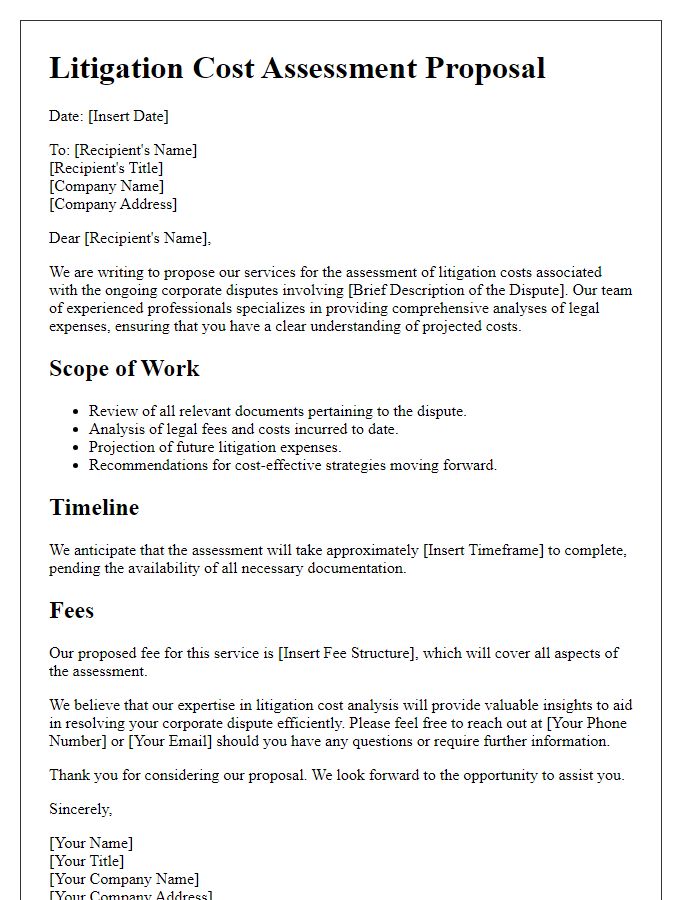
Letter template of litigation cost assessment proposal for personal injury claims.
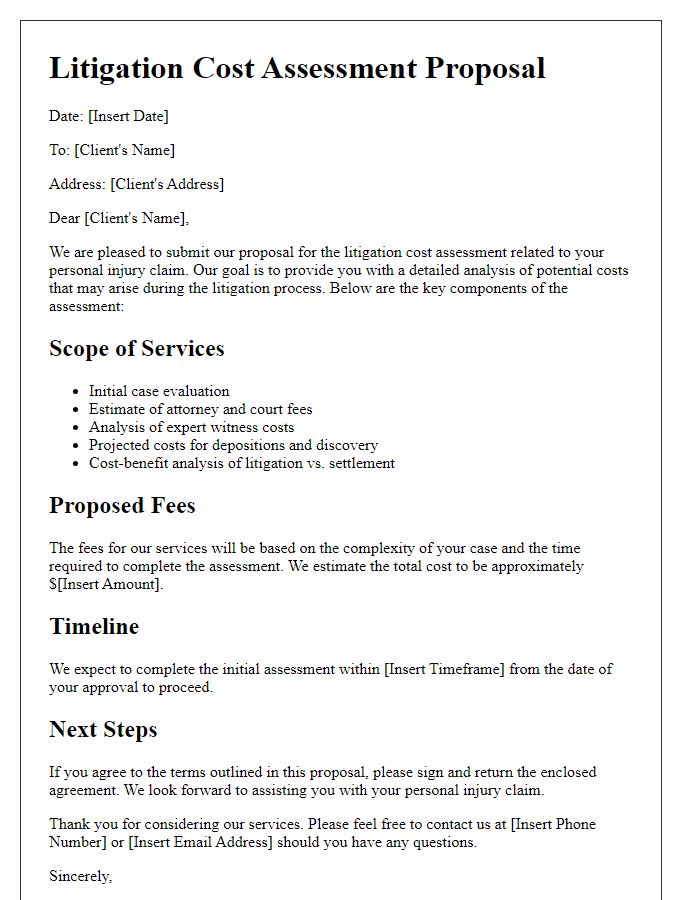
Letter template of litigation cost assessment proposal for intellectual property cases.
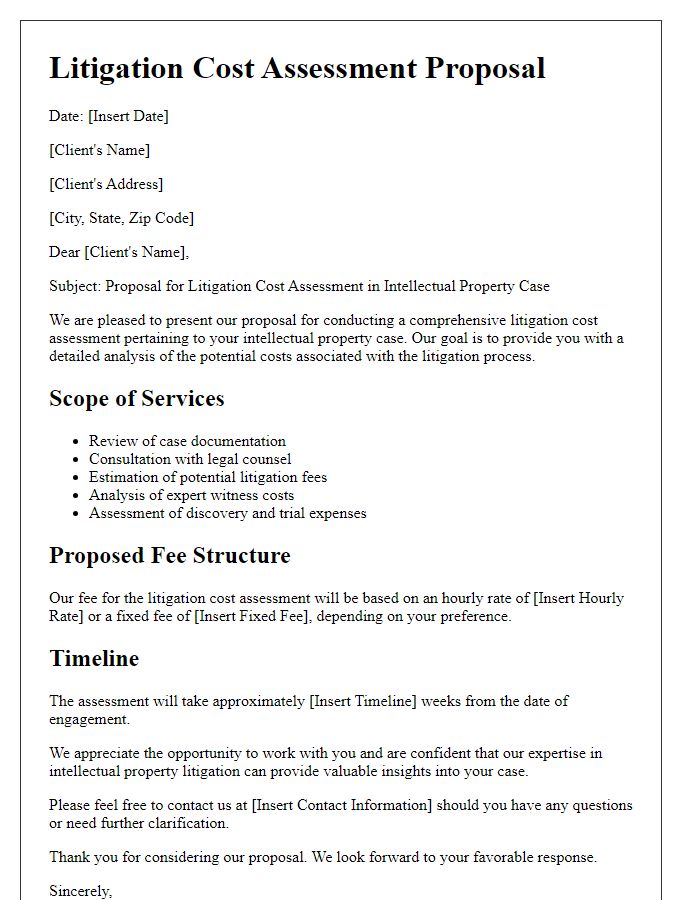
Letter template of litigation cost assessment proposal for employment disputes.
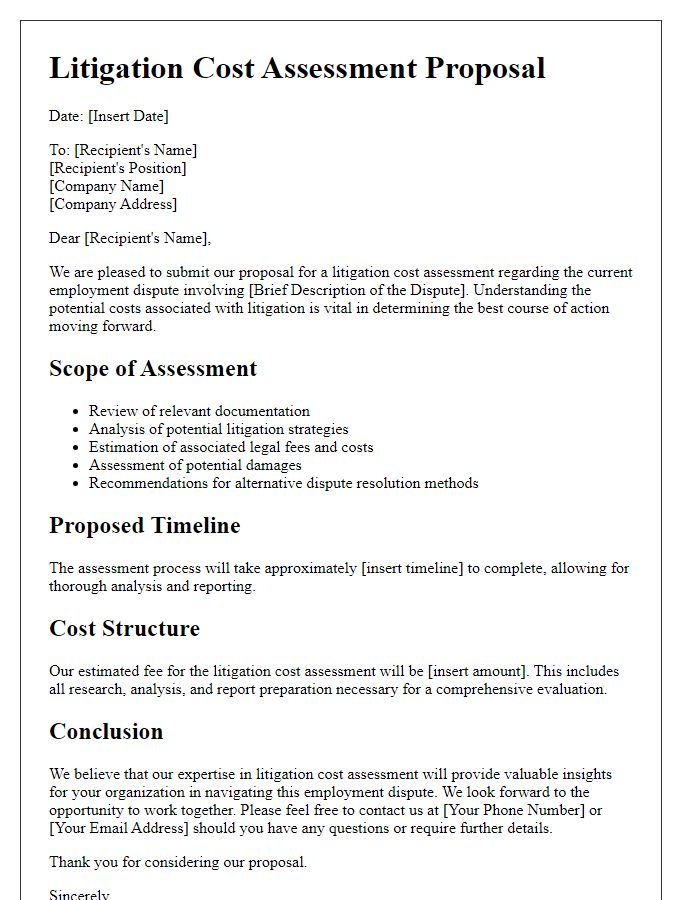
Letter template of litigation cost assessment proposal for family law matters.
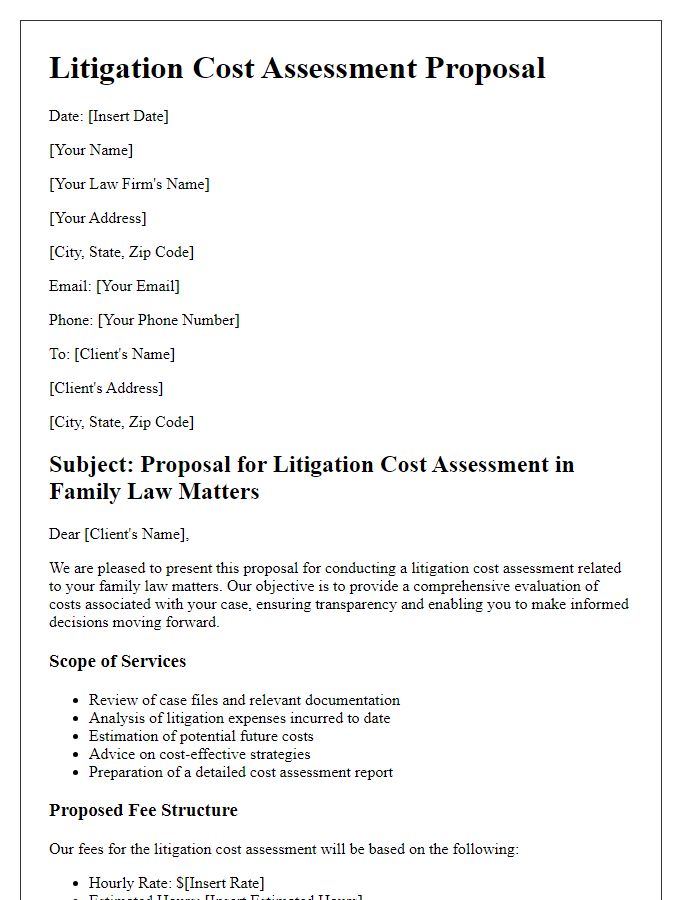
Letter template of litigation cost assessment proposal for real estate conflicts.
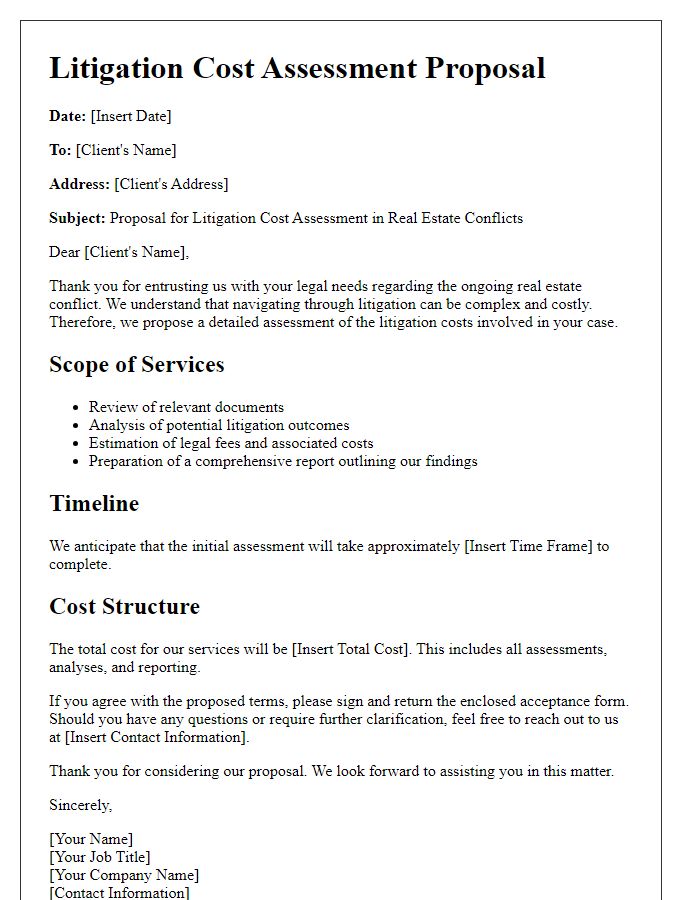
Letter template of litigation cost assessment proposal for commercial litigation.
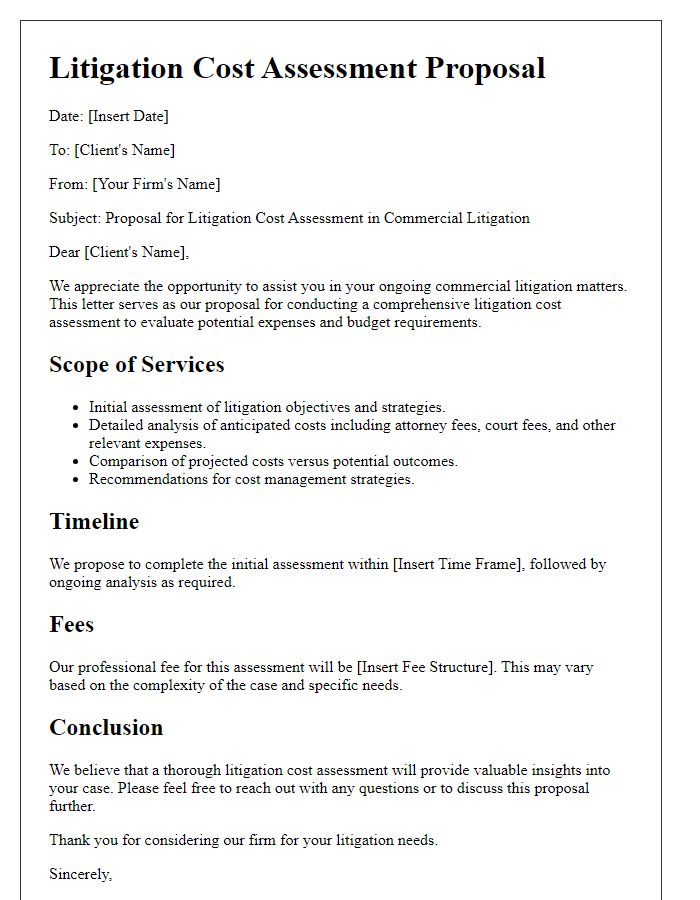
Letter template of litigation cost assessment proposal for contract disputes.
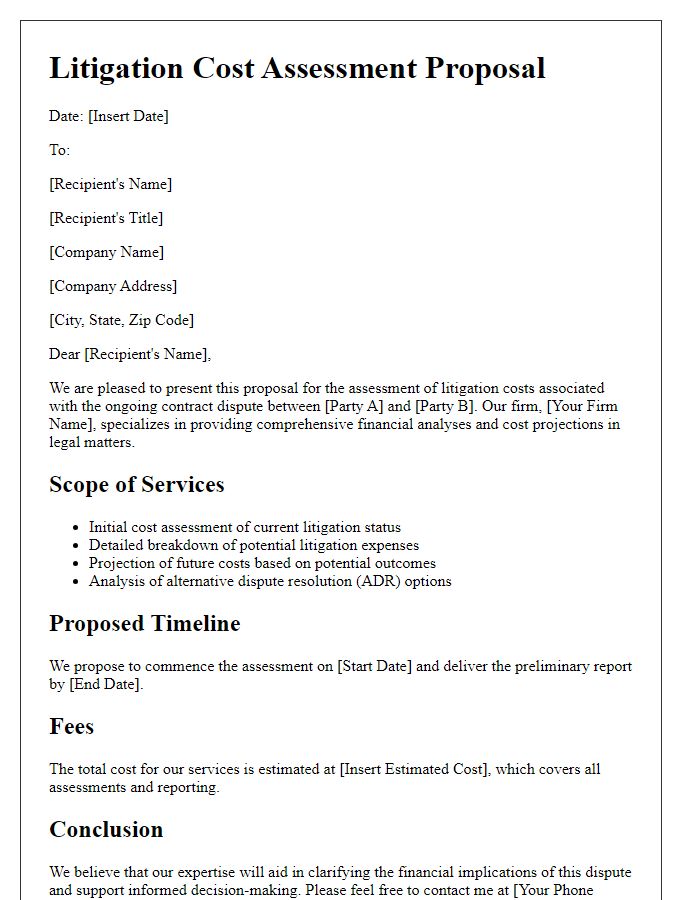
Letter template of litigation cost assessment proposal for class action suits.
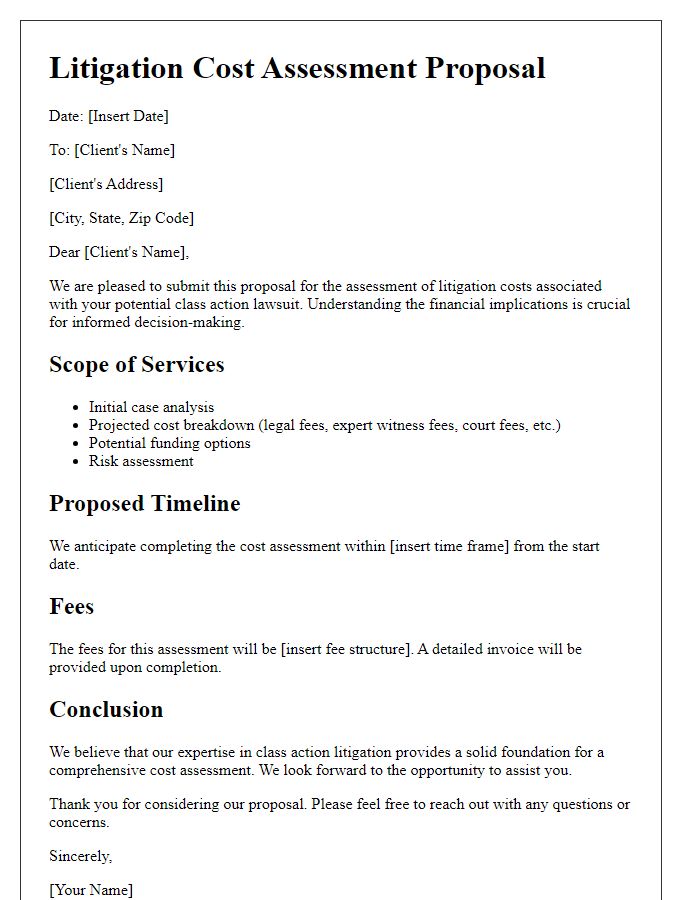

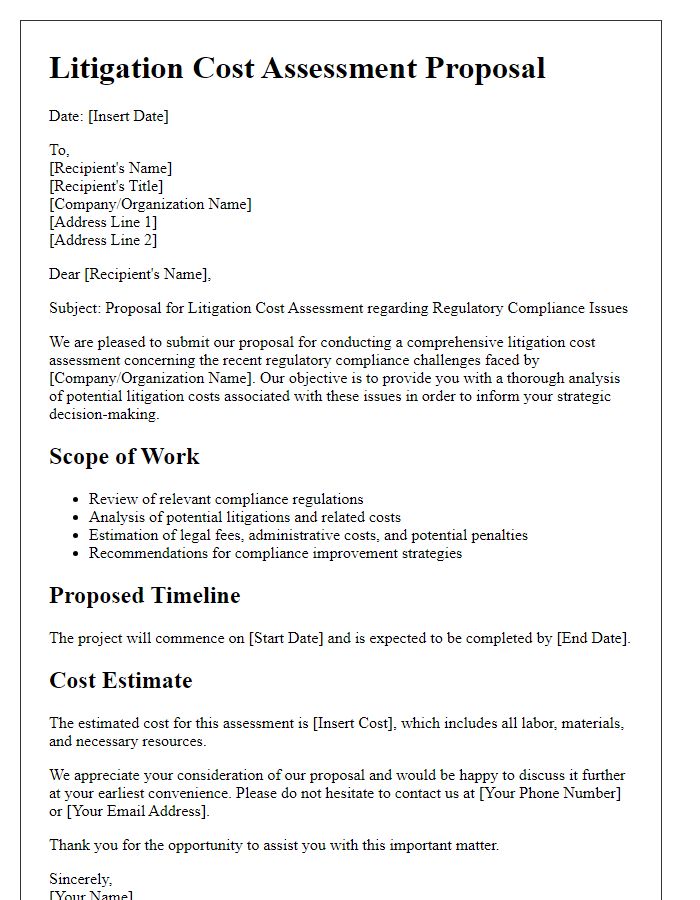

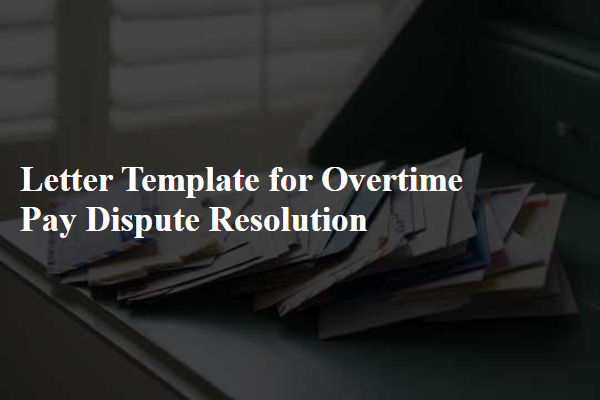
Comments